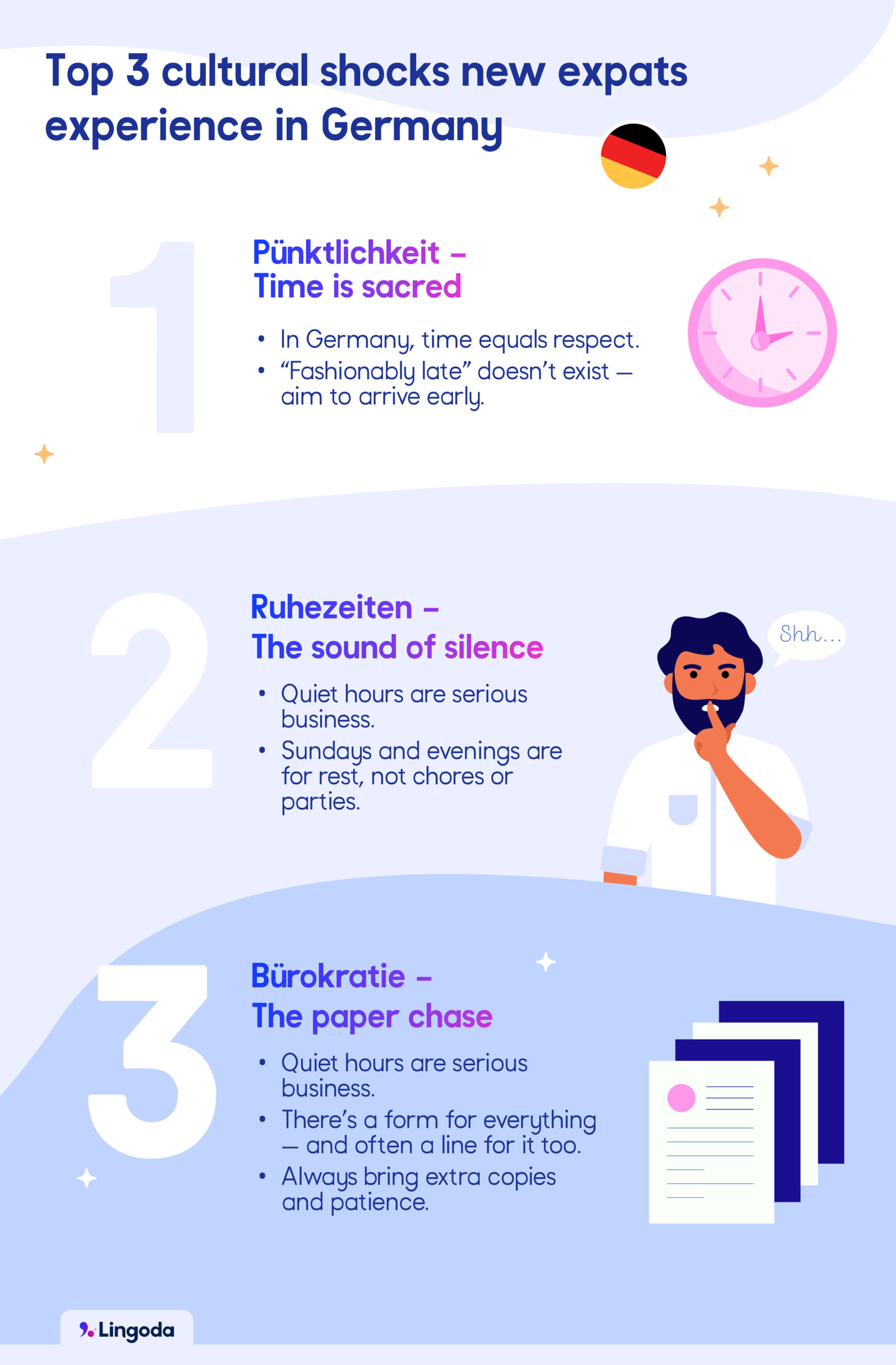9 cultural mistakes expats make in Germany
TL;DR Just arrived in Germany? You’re not alone if some everyday habits leave you puzzled. This guide walks you through nine common cultural mistakes expats make — from showing up late or ignoring quiet hours to struggling with bureaucracy or expecting instant friendships.
You’ll learn what to do instead, how to navigate daily life more smoothly, and how to adapt to German social norms without losing your own personality.

My first cultural shock in Germany came wrapped in a blanket of cold air. I had just moved from South America and was blissfully basking in the makeshift sauna I’d created with the heater on full blast. My German flatmate walked in, gasped, and threw all the windows wide open. “You need to lüften,” he said, explaining that it’s unhygienic to not air out a room daily (yes, even in winter). Within seconds, the temperature in our cozy living room plunged 20 degrees. I stood there shivering and realizing I was unprepared — not just for the weather, but for the culture I had just stepped into.
That’s when it hit me: in Germany, even everyday habits can turn into cultural landmines. So, if you’ve just arrived, here are nine mistakes I (and most expats) made in the first month — so you don’t have to!
- 1. Treating punctuality casually
- 2. Ignoring quiet hours (‘Ruhezeiten’)
- 3. Assuming everyone speaks English
- 4. Sorting trash incorrectly
- 5. Being indirect or over-polite
- 6. Not carrying cash
- 7. Underestimating bureaucracy
- 8. Expecting instant friendships
- 9. Not respecting personal space
- Cultural mistakes are part of the journey
1. Treating punctuality casually
I grew up running late through life. My parents had a talent for never arriving on time. As a kid, that meant walking into school after the bell or arriving at birthday parties when the cake was already half-eaten. So, far from an unwelcome hindrance, punctuality is my guilty pleasure as a Uruguayan in Germany.
In Germany, time isn’t just time. It’s respect. Showing up late to meet someone can come across as careless or rude, especially in professional settings.
Cultural tip: In Germany, “fashionably late” doesn’t exist. Aim to arrive five minutes early. It signals reliability, respect and a sense that you take others’ time seriously.
2. Ignoring quiet hours (‘Ruhezeiten’)
Living in expat-heavy corners of Berlin, I quickly grew used to a kind of joyful chaos. The Vietnamese family downstairs hosted karaoke at all times of day, and other neighbors’ parties lasted long into the night.
Then, I moved to a calmer district and it felt like stepping into another world. On Sundays, one could hear squirrels quarrelling over hazelnuts and branches creaking with the wind. That’s when I understood what Ruhezeiten really meant. For a society often seen as obsessed with work, it’s admirable how seriously Germans take their right (and duty) to rest. And you know what? It really grew on me.
Cultural tip: Check your building’s Hausordnung and local norms before doing chores or playing music. In Germany, peace and quiet aren’t just preferences, but part of the social contract.

3. Assuming everyone speaks English
You might get away with using English at the supermarket or doctor’s office in a big city, but venture into a mid-sized town or step inside a government agency, and reality hits quickly. English fluency isn’t a given — nor should it be, for that matter.
We all know that learning German takes time. It's not a global lingua franca, and it doesn’t roll off the tongue easily. But if you’ve chosen to live here, it makes sense to show a little consideration. Even if your skills are rough, tell people that — in German, of course.
Saying “Entschuldigung, ich spreche nur ein bisschen Deutsch” before switching to English shows humility and effort. Germans will usually meet that gesture with patience and kindness. Even my most embarrassing umlaut-less approaches and constant consonant stuttering tend to elicit a sympathetic smile.
Cultural tip: Learn 10–20 useful German phrases early — even “Ich spreche nur ein bisschen Deutsch” helps break the ice and earns respect. If you want to learn German, check out the Lingoda Launchpad, an award program that helps newcomers build confidence in everyday German and integrate more smoothly into life here.
4. Sorting trash incorrectly
I grew up with a mother who, back in the ’90s, had up to seven bins in our kitchen — compost, paper, plastic, metal, batteries, glass and mixed. Recycling wasn’t mainstream yet; it was more a technical term than a household habit. So, moving to Germany felt oddly familiar. I find it satisfying — even ethically relieving — to live in a country that turns Mülltrennung (waste separation) into a national sport.
What did surprise me, though, was the community’s unofficial recycling network — the shared understanding about when and where to leave unwanted furniture, clothes or household items. Entire neighborhoods seem to coordinate this silently. I’ve furnished my flat almost entirely from Sunday walks around Prenzlauer Berg and keep my wardrobe fresh thanks to a local Kiez sharing point.
Cultural tip: Learn the color codes: yellow for packaging, blue for paper, brown for organic waste, black for general trash, and separate bins for glass by color. Your neighbors (and landlord) will notice if you get it wrong.
5. Being indirect or over-polite
Germans value directness — it’s efficient, not rude. Clarity saves everyone’s time and shows confidence.
My wife is English. You can safely assume that even the simplest question in her family starts and ends with “please” and may even be baroquely decorated with “perhaps,” “if it’s not too much to ask,” “sorry to bother,” “could I please,” “maybe,” “at your convenience,” and “sorry.”
It was funny (and kind of endearing) to observe her early days in Germany. She’d approach straight-faced passersby with her usual parade of gentilesse, asking for directions with a dazzling smile while they glanced at their watches wishing she’d just say it. Fast-forward a few years, and my once painfully polite wife now asks for things clearly, kindly and efficiently.
Cultural tip: Practice being straightforward. Say “I need help with…” instead of “Maybe we could…” or “Sorry to bother you, but…”. In Germany, polite doesn’t mean wordy — it means clear.
6. Not carrying cash
How can the engine of the European Union — the cutting edge of engineering culture, the historic core of the Hanseatic League, and home to some of Europe’s biggest banks — still be so cash-centered? It’s anthropology research material, really. I can almost picture David Attenborough narrating my trips to the bakery: “Here we observe one of nature’s most intriguing mysteries — the German cashier rejecting a card payment for a €2 croissant.”
And indeed! In almost every other European country, even street newspaper sellers carry portable card readers. Yet in Germany, cash remains king. You’ll often need it even at government offices. Paper is real; digits are not.
Cultural tip: Suck it up. Find your nearest ATM and get used to the comforting jingle of coins in your pocket — especially for bakeries, cafés, markets and ticket machines.
7. Underestimating bureaucracy
Bureaucracy in Germany is outdated technologically, logically and sometimes (it seems) even morally. There’s a form for everything, and the less “conventional” your life is, the harder the system pushes back.
It’s annoying enough for a single, childless German with one job and one address. Now imagine a Uruguayan-born Italian married to an Australian Brit and freelancing as a barista, writer and massage therapist. Every time I visit family abroad, my Krankenkasse (German health insurance company) collapses in confusion.
Cultural tip: Register early, book appointments well in advance, and always bring extra copies of every document. Expect to wait in a fluorescent-lit room with 40-year-old furniture, four empty counters and two that actually work. Be prepared: if your German is below B2, bring a friend who owes you a favor to translate. And yet — every once in a while — you’ll meet a rare bureaucratic angel who restores your faith in the system for a few precious minutes.
8. Expecting instant friendships
In most countries in Europe, there’s a region known for having a slow-cook recipe for making friends, where they’re harder to make but loyal and everlasting once acquired. Well, in Germany, that region is the entire country.
Here, you don’t become a “friend” through a few nights out or a string of funny stories. You start as an acquaintance — sometimes for a long while — and only after shared effort or proven reliability do you cross the invisible line into real friendship. Having beers together won’t do it. Helping someone move apartments, on the other hand? That’s how you earn your place.
Cultural tip: The gap between North American easy (though often superficial) friendliness and German reserve can feel intimidating, but don’t take it personally. Prove your human worth! Be dependable, show up, keep your word, and you’ll find that once a German lets you in, they stay for good. Be consistent, join local clubs or hobby groups, and always say “yes” to second or third invitations — that’s where trust begins.
9. Not respecting personal space
Personal space in South America is close to non-existent. My experience in Anglo countries is that it’s inversely proportional to how drunk you are.
Germany sits somewhere in between. Among friends, closeness is normal — after all, as we’ve seen, it takes real effort to reach that level of friendship. But with strangers, distance matters. This is especially true when riding on public transport, sharing park benches and queuing, which Germans truly love doing. Even after years in Germany, I still find myself wondering whether someone standing a meter and a half away from the next person is actually in line or just hanging out near it.
Cultural tip: Leave at least an arm’s length when standing in line, and don’t assume close contact is comfortable unless invited.
Cultural mistakes are part of the journey
If there’s one thing I’ve learned after years in Germany, it’s that cultural mistakes aren’t failures but milestones (or, at least, fun memories to share with your expat friends and your family back home). Every awkward encounter or confused exchange is a small step toward understanding how another society works. It’s the price of admission for living somewhere new, and the only real error is to avoid interactions for fear of them.
With a bit of awareness, curiosity and humility, Germany starts feeling less like a puzzle and more like home. And it happens faster than you’d think.













